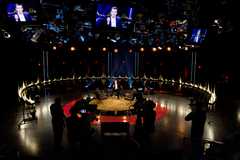Frederik Skavlan / Stockholm
Talk of the town
‘Skavlan’ is the most popular talk show in Scandinavia, watched by over three million people across Norway, Sweden and Denmark. Its host Fredrik Skavlan has a sharp eye for finding the chemistry between seemingly disparate guests. Monocle spent a day on and off-set in Stockholm.
“On tonight’s show we have Siv Jensen, the Norwegian finance minister who is quite controversial and now carries this huge wallet of 5,000bn krone [about €600bn] from the Norwegian oil fund. Next we have the female boxer Frida Wallberg, who was the world champion but was knocked into a coma last year – she has a very powerful story. Then we have the rock star and actor Jared Leto, Oscar-nominated for Dallas Buyers Club, who will bring a different sort of energy, and finally the singer Lorde.
We research each guest then all the guests together to see where they might have things in common. One of the strengths of the show is that you’ll never see these people in the same room again.
On a regular shooting day I’ll walk over the road from my flat here in Stockholm and have a coffee while running through my notes on the guests. Sometimes I’ll walk through the city to our office and the studio at the TV-Huset. Stockholm is beautiful; what a great way to see the rest of the day clearly.
We film ‘as live’ in an hour and 20 minutes and edit it down to 58 minutes for prime time Friday night television in Sweden [on SVT] and Norway [NRK], and the next day we go out in Denmark [dr2]. I’m a Norwegian but here in Sweden people wouldn’t understand me, so I drop in a lot of Swedish words. My Norwegian viewers somehow accept and understand this. Broken English is the biggest language in the world; if we are Danish, Swedish and Norwegian then we struggle to communicate but as soon as an English person comes in we become ‘The Scandinavians’ and are kind of united.
Typically, we also record a few shows per season in England. Next season I’d like it to be 50 per cent of our shows because in London we can get different, more international guests. In fact, we have two sets – one in London and one in Stockholm that look the same so that it’s always the same show.
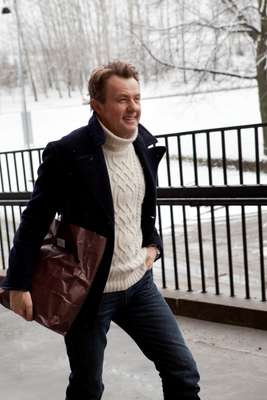
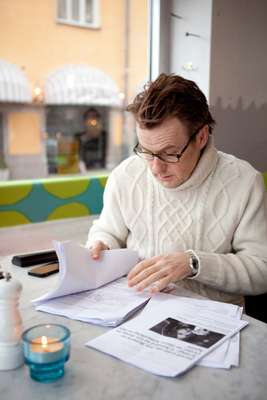
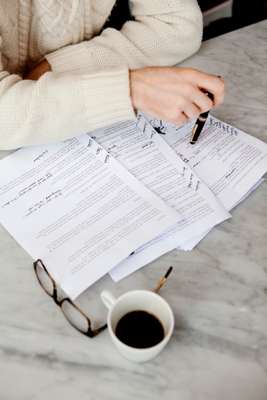
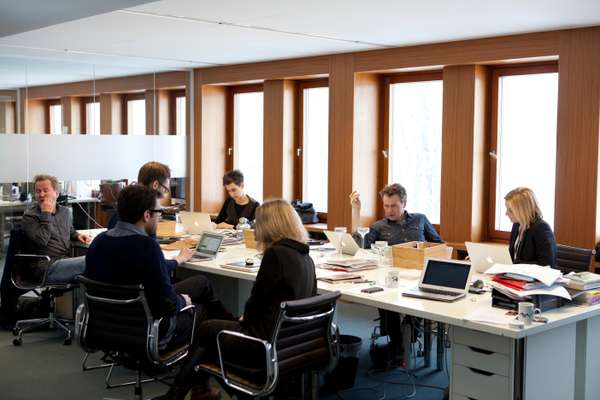
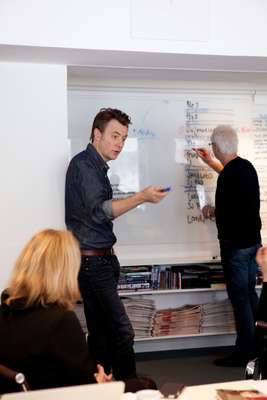
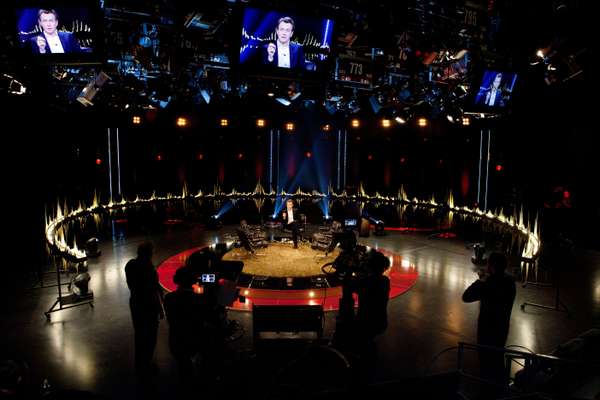
The last show we did there was with Bill Gates, Debbie Harry, Magnus Carlsen [the 23-year-old world chess champion] and Philomena Lee [on whom the film Philomena was based]. What a weird line-up! We were talking about whether or not you’re a party person; I was asking Magnus how he celebrates after a win because he’s a sort-of nerd. And then Bill Gates got the biggest laugh for saying that people hate him at parties because all he wants to talk about is malaria.
With guests like Bill Clinton it’s important to humanise them; make it informal. We did a special with Tony Blair at the Grand Hotel in Stockholm; he came in a suit and tie, and I had no tie, so the interview starts with him taking his off. It’s nice to show that this is the sort of interview we’re going to do and of course it’s an interesting detail.
With these interviews there are difficult questions and topics perhaps they’d love to avoid but having this informal way of interviewing makes it easier to ask, ‘how did you feel about this, what do you think about that?’ It’s a good tool to get to the truth.
We wondered if guests would behave differently in London than they have done in Sweden, maybe being more on their guard, but that hasn’t happened. Is there a recipe? When you know you have contact. Guests come with an agenda – I need to sort of manipulate that and get them to live in the now. It’s important for me not to think of the next question but to just take in the guest; a genuine conversation is always very good television. But TV is brutal; if it’s fake you see it, if it’s acted you see it. The first time I meet most guests is there in the studio. It’s a good thing because I want it to be genuine and authentic, and the viewers to have a hunch that this is the first meeting and it might be a bit exciting.
Growing up in Oslo was a privilege. My father started off as an actor. He went to Hollywood when he was young and got to play a German soldier or two. He came back again, produced a couple of movies and became a businessman while my mother was an artist. We had the sort of house where there were interesting things lying around.
It wasn’t bohemian but there was a lot of talk. I’m the youngest child of four, so you could say I have been challenged to get along with people for a long time. Television wasn’t my ambition. I wrote about TV for a big Norwegian newspaper [both Morgenbladet and Dagbladet] and when you write about something people in that field tend to read it. I was invited down for an audition, maybe just to humiliate me, I didn’t know. Originally the testing I did was terrible, they were considering scrapping it to protect me from myself but eventually we got there. The first show I ever did I thought went really well. I called my mother and she just said, ‘you need longer socks’.
There has always been the misconception that this is a late-night chat show. It might be from time to time but it’s a talk show that can be an entertainment show, a political show, an affairs show. It’s like how a newspaper is put together and I’m a newspaper man to the core.
Often you can have a politician coming on expecting a chat show and ending up saying some strange things to try and be funny. Once we had the Norwegian defence minister on the show, she was a great guest but there was trouble with the Norwegian army at that time so I asked if, actually, she had control over the army. There was a pause and she said, ‘no’. The audience laughed but the next day it was front-page news. Things slip out.
In a way it’s a very old-fashioned programme; it’s not a comedy show: I’m a journalist not a comedian. We have a lot of talk shows now that are all about making the host funny – Jimmy Fallon or David Letterman – and they are genuinely funny but we’re different. We don’t have writers, we have journalists and our job is to make the light shine on the guests, not on me.
You could view this whole thing as some kind of drama; you have to cast it, have the right contrasts, have a red thread running through the show, a callback to what you said earlier. Although we have very little script: the more improvised it is, the better.
I live with an actress from the Royal Dramaten [Maria Bonnevie] in Stockholm and she does a lot of films, so we travel and have a lot of flexibility. We have a flat here in Stockholm and a house in Oslo, and we’re always discussing how we live back and forth. I choose Stockholm for the culture and Oslo for the nature, and I expect both Swedes and Norwegians hate me for that! It’s a busy life but a nice life. When I’m off-season I’m really off-season. We have a house down in the Swedish southwest where I can do nothing for three months.
So, today’s show looks tough – how am I going to get these people to all talk together? I think I’ll ask Siv about her temperament and include Frida, the boxer, because they have this huge anger, both of them. It’s fascinating that if you have this anger you can channel it in sport or debates or whatever. Jared Leto just made a film about his fight with his record label. They sued him for $30m (€21.8m) – I wonder if he has any advice for Lorde, who’s so young and new in the music industry? It will be interesting. If I don’t get butterflies before the show I’m in trouble. I need to be a bit nervous before the cameras roll but I never watch my own shows. I couldn’t really say how well it goes.”

